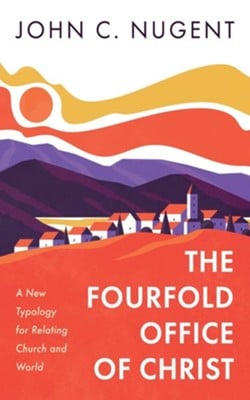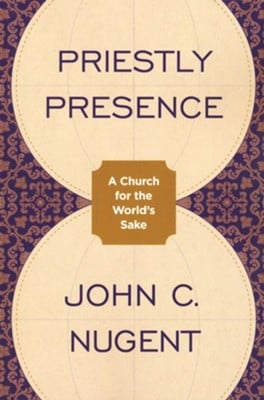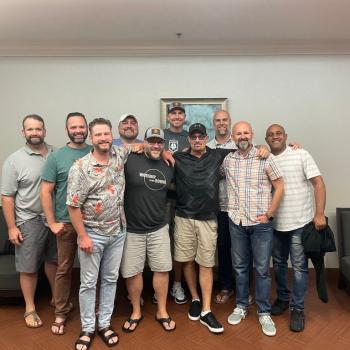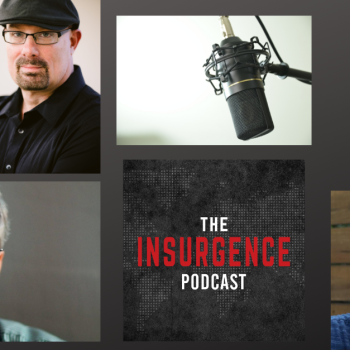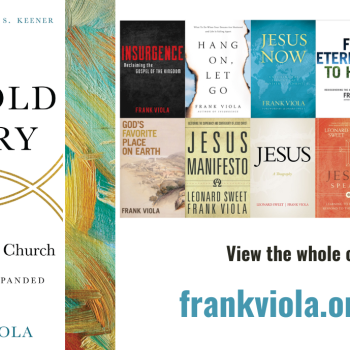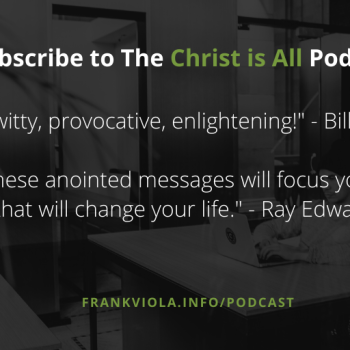John Nugent is a friend and a thoughtful Jesus-follower who has written a number of valuable books.
He was also my conversation partner in fourteen episodes of The Insurgence Podcast. Each episode is well worth consuming. I appreciate John’s insights, especially on some of the controversial topics we tackled on the podcast.
I caught up with John recently to discuss two of his recent books, The Fourfold Office of Christ and Priestly Presence.
Enjoy!
When I first laid my hands on your book, The Fourfold Office of Christ, I thought it was going to be a discussion on the various ministries of Jesus, something that I did in Jesus Now.
However, as I went through it, I discovered that this is a book that identifies and then critiques certain models that various churches employ in their relationship to the world.
You describe them in terms of the Kingly model, the Servant model, the Prophetic model, and the Priestly model, and then you end the book with the revised Priestly model.
It seems to me that your book is really about how the body of Christ wields power in the world and in its relationship to the world. Would you say that is an accurate assessment or not?
Absolutely! This is book is mostly about how God has called the body of Christ to relate to the world. This is more obvious in the book’s subtitle, “A New Typology for Relating Church and World,” than it is in the main title, “The Fourfold Office of Christ.”
Notions of power factor prominently in several chapters, but it isn’t necessarily the focus of the book. That said, the next book I write will most likely be about power, authority, and leadership in God’s kingdom. I’ve already taught through this material with college student and in congregational contexts. Soon I will be working through this material with graduate students who are already in ministry, so I hope to refine my ideas with their help.
Let’s start with chapter 2, the Scriptural Method. It’s interesting to me that you use the term “historical Christocentric lens” to understand the Bible as well as the term “biblical narrative.” These are terms that I myself have used to describe my approach to Scripture in books like Jesus: A Theography and other volumes that use narrative exegesis.
Explain what you mean by the “historical Christocentric” lens to understand the Bible.
People who read the Bible carefully tend to take one of two competing approaches. Some read it sequentially, like any other historical book, from beginning to end. And so Jesus becomes a main character very late in the narrative and isn’t quite given the full honor due him.
Others read it spiritually and look for Jesus under every rock in the Old Testament. While this approach rightly elevates Jesus as the center of the Bible story and salvation history, it can compromise the foundation of a proper understanding of Jesus. This makes it easy to misinterpret Jesus in light of some other foundation of our choosing.
A historical Christocentric lens strives to read the whole Bible on its own terms by paying attention to each book’s unique voice while recognizing it as harmonizing with all the other voices, which together sing the praise of Jesus. Though the entire story is Christ’s story, he makes his grand entrance right on time, in the fullness of time. Yet this is not fully appreciated when readers run roughshod over the key events and narrative movements that pave the way for him.
Let’s go through each of the models you identify and critique one at a time. What I would like you to do to make this practical and easy for any Christian to understand is to: 1. Identify the particular model, and 2. Give a practical example—it could be imagined or real—of a church that embraces that particular model that, in your viewpoint, is not in line with Scripture.
So let’s begin with the Kingly model church. Identify it and give a practical example of a church that embraces it in a way that’s not in line with Scripture.
The kingly model imagines that God has commissioned and equipped his people to wield top-down power to make this world a better place.
I see this in progressive churches who make strategic alliances with left-leaning civic leaders and organizations to use their power and resources to achieve what they believe to be kingdom goals. I see this among evangelical churches who do the same with the political right with its own institutions and pet projects.
They both confuse genuine but fleeting world improvement with God’s kingdom mission, which centers on the Kingdom of God, which far surpasses the best possible versions of the kingdoms of this world.
Identify the Servant model church, and give a practical example—imagined or real—of a church that embraces this particular model in a way that’s not in line with Scripture.
Servant churches are similar to kingly churches, except instead of using top-down political or other powerful world institutions to make the world better, they use more humble techniques to accomplish the same purpose.
These also come in left- and right-leaning forms. It could be a church whose identity revolves around any number social needs—whether poverty, education, or a particularly vulnerable people group.
All churches should be involved with such issues as an important part of their example and witness, but servant churches make such causes the center of their sense of Christian mission, which goes too far. Sometimes it’s a lot easier to serve the stranger whom we often keep at arm’s length than to love the brother or sister in Christ whose daily life God has sought to intertwine with ours in ways that are messy and yet beautifully redemptive.
Identify the Prophetic model church, and give a practical example—imagined or real—of a church that embraces this particular model in a way that’s not in line with Scripture.
Prophetic churches are usually associated with progressive ideas and seem to live from protest to protest. They lament injustices in this world, and they see their role as speaking truth to the powers who perpetuate them.
Some take to the streets holding signs and others use the church pulpit as a platform for perpetual political commentary. This leads to congregants who then use their own public platforms—whether Twitter, Facebook, YouTube, or Instagram—to do the same.
They tend to spend more time criticizing common public enemies than energizing their neighbors with the good news of God’s kingdom. That’s not what prophets do in the Bible and it’s not how God calls his people to relate to unbelievers.
Identify the Priestly model church, and give a practical example—imagined or real—of a church that embraces this particular model in a way that’s not in line with Scripture.
A priestly church stays away from social and political issues and focuses exclusively on teaching and preaching about the personal salvation that God offers individuals through Jesus.
A lot of small country churches fit this bill, but also large evangelical churches.
These churches care a lot about people’s souls, but often do little to address their day-to-day social and economic needs. They tend to divorce the vertical dimensions of the gospel from the horizontal dimensions in ways that would have been alien to ancient Israel and the early church. Biblical witness is not a-political; it is overtly political in Christian cosmopolitan ways that transcend the provincial politics of this world.
Discuss the revised Priestly model church.
The Revised Priestly model attempts to meld the important vertical dimensions of the gospel with the important horizontal dimensions by fusing them together in the set apart life of the kingdom community.
It follows the example of priestly Levites in the Old Testament who tended to Israel’s relationship with God by way of the sacrificial system while also hosting undesirables in cities of refuge, teaching God’s word and its implications for all aspects of life, modeling godly praise, and embracing their God-given status as exiles who don’t belong to the institutions and agendas of the wider citizenry.
This model has a place for service, but it serves God first according to God’s mandate for his people. It has a place for prophecy, but it directs God’s-word-for-the-church to the church and God’s-word-for-the-world to the world, something that prophetic types often struggle to keep straight.
It also resists all attempts to rule this world in top down “kingly” ways that fly in the face of God’s lessons to Israel, the explicit teachings of Jesus, and the obedient example of the apostolic church.
These various types of church are not simply different strategies that are appropriate for different times. Cross examination from the Scriptures shows that some are simply unfit for how God has called his people to relate to the unbelieving world.
Throughout the book, you name a number of well-known authors and scholars as representations of your critiques. What have their reactions to the book been?
Crickets, mostly. I’m not sure they’ve even read my book.
But careful reviewers and seminary students who’ve been assigned it tend to think it covers the contemporary landscape of options in a thorough and creative way.
Many have said that it took a while before they realized that I don’t actually agree with all of the different views I present. This is because I go out of my way to present each view as sympathetically as possible, highlighting its key ideas, strengths, weaknesses, and areas for improvement.
One final question before we get to your follow-up work. The New Testament uses terms like “strangers,” “pilgrims” and “aliens” to describe God’s people. How do you understand those terms practically for believers today? And what do you say to the Christian who says, “I’m just a sojourner and alien on this earth. It’s not my home so I am not going to get involved in the world at all.”
I want to affirm Christians who see themselves as sojourners or aliens on this earth. Way too many believers have become way too comfortable and have mixed following Jesus with being good citizens in whatever country they live in.
Having said that, I must insist that biblical aliens and exiles were NOT apathetic to the plight of the wider world. They saw themselves as set apart from this world in order that they might serve this world in the very specific ways to which God has called us.
God has not abandoned this world. It is his mission to redeem it. Toward this end, he formed a set apart people to welcome this redemption and to live into it as a part the redeemed communities of faith we call church (among other things). God’s alien people exist for the world or not at all.
Let’s get into your next book, Priestly Presence. Why did you write this book?
I wrote this book as a sequel to an earlier book called Endangered Gospel: How Fixing the World is Killing the Church. That book focuses on the good news that spans Scripture and finds its fulfillment in Christ and his body. It was about evangelism at its core, but some people got hung up on my critique of Christians who seem to love trying to fix the world more than they love the body of Christ, of whom Christ said “they will know we are Christians by our love for one another.”
But the subtitle of that book was off putting and perhaps kept people from being able to see the evangelistic thrust of that book’s argument. I spent so much time making the case that our witness to the world MUST be grounded in our loving (light of the world, city on a hill) life together that some readers missed my insistence that our radical love for one another serves God’s purpose of using us to draw all lost people to himself.
The subtitle of Priestly Presence:A Church for the World’s Sake, seeks to make this connection explicit. Some Christians really appreciate the new life they have found among their church family, and others really enjoy doing active things among lost people to make their life better. I wrote this book because I want Jesus followers to see that these two dimensions belong together more strongly than most believers dare to imagine and thus fail to truly experience.
Every book has a big idea. What’s the big idea behind Priestly Presence?
Christian responsibility is super important. But responsibility means more than being a responsible citizen and doing right by our neighbors and neighborhoods.
Israel’s priests bore the most crucial responsibilities among all Israelites. If they did not administer the sacrificial system, teach Torah, embrace their exilic posture, host cities of refuge, and lead out in true praise – then Israel as a whole would go astray, which is exactly what happened. It happened because the Levites neglected their unique calling, started living like other Israelites, and meddled in territorial governance in ways God had not authorized.
Likewise, the church has a unique set of God-given responsibilities. If we don’t remain true to them, but assume unauthorized (by God) responsibilities that others (the world) would like us to carry out, then our crucial role in representing God’s kingdom among all the kingdoms of this world will also fail. And it’s the lost people of this world who will suffer the most.
Bottom line: being responsible for some really important things means forgoing responsibility for other really important things. If we truly love God and world, we will embrace our priestly responsibility and its corresponding irresponsibility.
Discuss the distinguishing marks of a kingdom-displaying church, in your opinion.
In the appendix of Endangered Gospel and Priestly Presence, I list 25 marks of a kingdom displaying church. I won’t list those here, but I will explain the significance of this list.
God’s mission for his people has a simple logic to it. God wants us to form communities whose life together serves as a sign and foretaste of his kingdom. This is because we are the evidence Jesus left behind that God has changed the course of world history and inaugurated a new kingdom in the midst of the kingdoms of this world that are fading away.
God had given the world a chance to taste and see his good kingdom. To do so, he commissioned his people to fill every city all across the globe with microcosms or demonstration plots of his kingdom.
We are like a model home that a developer builds at the entrance of a new development that will soon be populated with new homes. If people want to know what it will be like to live in that development, they can go inside the model home and see for themselves.
The church was meant to be like that. Lost people should be able to walk among us and catch a glimpse of what God’s kingdom is like. All creation will eventually be brought in line with God’s kingdom and so Christians are the forerunners who are paving the way according to the example of Jesus, the ultimate pioneer and forerunner of our faith.
The church’s first responsibility is to be the church—to be a true representation of God’s kingdom. We must embrace God’s kingdom as our way of life, we must display God’s kingdom in our life together, and we must proclaim God’s kingdom as a gift that God wishes to offer to all people.
These 25 distinguishing marks are a list of kingdom characteristics that I have collected from the teachings of Jesus, especially his kingdom parables, and the way of life that the NT authors asked the early church to embrace as their own way of life. Examples include loving, peacemaking, forgiving, show equality, appreciating small beginnings, and placing God’s kingdom above all things.
If churches were to simply copy that one page and begin to live like it, they would make great strides for the kingdom, which means great things for lost people in this world.
Give some practical examples of how a local assembly can embody the kingdom of God, particularly a local church that manifests what you’d consider a correct understanding of the kingly, servant, priestly, and prophetic roles of the Lord Jesus.
Immigration is a practical example. A kingly church may do its best to change the laws or place Christians in positions of political or legislative power to enact and enforce laws with their preferred approach in mind.
A servant church might start a program that offers services to immigrants in their community.
A prophetic church might scold various government officials and agencies who approach immigration wrongly from the pulpit or join a local march to hold up signs representing their view.
Priestly churches may be temped to leave it to the politicians to figure it out and just stick to preaching the gospel of salvation by grace through faith. None of these approaches quite captures a full Christian approach.
A revised priestly approach begins with the presumption that as followers of Jesus we too are aliens who live on foreign soil. We recognize the promises and perils that come from not fitting it, from speaking a different language, and from struggling with several aspects of our host culture.
We will extend risky hospitality to folk who need a place to stay. We will welcome them into our gatherings, our prayer meetings, our Bible studies, our service projects, our celebrations, and our holidays.
We will not consider them political causes to champion, but fellow aliens trying to making their way the best they know how. And we will share our ways with them to see if the gift of new life in Christ and his kingdom is something they want to embrace, display, and proclaim alongside us.
If they happen to be in the country illegally and end up being arrested, we will visit them in prison, pray for and with them, and do what we can to support their needs.
If they get deported, we will track their whereabouts and monitor their well being. There may be opportunities to provide support, to visit, to relocate near them, or to connect them to a supportive church family where they live.
We will do our best to view the entire situation from a kingdom perspective and not a partisan one. We will invite them into our family and treat them like family.
I end The Fourfold Office of Christ by considering the practice of voting. There I discuss how people from the various postures I discuss in these books might engage election season as believers and I conclude with specific ideas of what a revised priestly approach might entail.
Share 3 “aha” moments that struck you the most while writing the book.
First, the Revised Priestly Approach is truly ecumenical. Indeed none of the postures I explore in these books belongs to just one denomination. They represent postures that Christians can take from within just about any denomination.
Second, my chapter on “priestly praise” in Priestly Presence gave me some genuinely new insights into the nature of Christian speech. I realized just how much Christian speech today has been coopted by the ideologies of our day and fails to reflect the example of Christ and his devout followers. It has been a challenge and an adventure to strive to speak like they did.
Third, God intended the Christian walk to be so much more interesting than we have often made it out to be. We were meant to be truly peculiar and innovative. Unfortunately, we’ve settled for Christianized versions of this world’s tired, dysfunctional, doomed-to-fail attempts at world betterment. My zeal for abundant life in Christ, as a part of his body, on behalf of this world has been reinvigorated with fresh dreams and possibilities.
What else would you like readers to know about these two books.
It is best to read them with fellow believers. Try first to understand what each chapter is saying before making judgements about their claims. Also, be patient. Both books have chapters that build upon each other. Things that may seem vague in earlier chapters become crystal clear in later ones. In some ways these books stand alone. In others they belong together and presuppose the work I did in Endangered Gospel.
Above all, please test the claims of these books against Scripture. The scriptural support in each chapter is integral to the argument of that chapter. So take your time, look up the verses, and ask whether they are saying what I am claiming they say. That is the truest test of any book for the church.
I ask this question often to people I interview. Tell us what your regular spiritual routine of Bible reading and prayer is right now. And also what it was previous to this month (if you changed it over the years).
I am part of a church family that devotes a significant amount of time to praying with and for one another out loud. Each person has ample opportunity to share life while the body listens attentively. Different people will then pray for them by name.
I pray several mornings a week with a Christian brother with whom I work out. Prayer accompanies all of my meals and nearly every meeting I share with fellow believers. I usually pray whenever I walk or drive alone and before going to sleep.
Our church is a network of home groups each of which distributes a list of prayer requests. I make a point to pray through these lists. When something urgent has happened, our church gathers in homes immediately and prays about it together.
I frequently receive texts, emails, and social media requests to pray for time sensitive needs, and so I do. In short, I try to embody the practice of praying at all times.
I see a need in my life for getting away from my normal places of work and daily living for extended times of prayer. I am not sure exactly what that will look like, but I look forward to it!
My church family also sets time aside each week to study Scripture together. When teaching those studies, I often spend several hours reading Scripture to prepare. The same goes for various Bible teaching invitations, whether conferences, retreats, sermons, writing project, and weekly podcast episodes with the After Class Podcast.
As a theologian I am constantly curious about theological questions people pose to me whether in the classroom, over social media, by text, or by E-mail. So I take time to study the Scriptures before answering. I prefer to give as biblical of an answer as I can.
Most of these times in the Word are task-driven. I have an assignment or a question and I study the Scriptures as part of the process for discerning an answer.
I also find it important to read the Bible with no specific agenda. So I keep my Bible on the end table by the seat in my living room from which I do work on my laptop or watch shows. My practice is to spend time in the Word of God before beginning work on my laptop or watching a show in the evening.
This reading often follows a plan that I did not personally devise. Sometimes its one that several people in church are doing. Right now I am reading the Bible from back to front: from Revelation to Genesis. I have found that enlightening.
I recently took up the practice of mentally walking my way through the Bible story. When doing so, I am able to spot areas of confusion or forgetfulness. This motivates me to return to the Word with special attention to those sections that I have greater difficulty recalling.
Finally, our church just launched the project of creating our own, in-house, audio Bible. So we are all taking turns immersing ourselves in various books and then going to a friend’s studio to record our readings together. It is less about producing a polished work and more about spending time in God’s Word together and listening to it through the voice of good friends who are fellow traveler’s on journey of faith.


